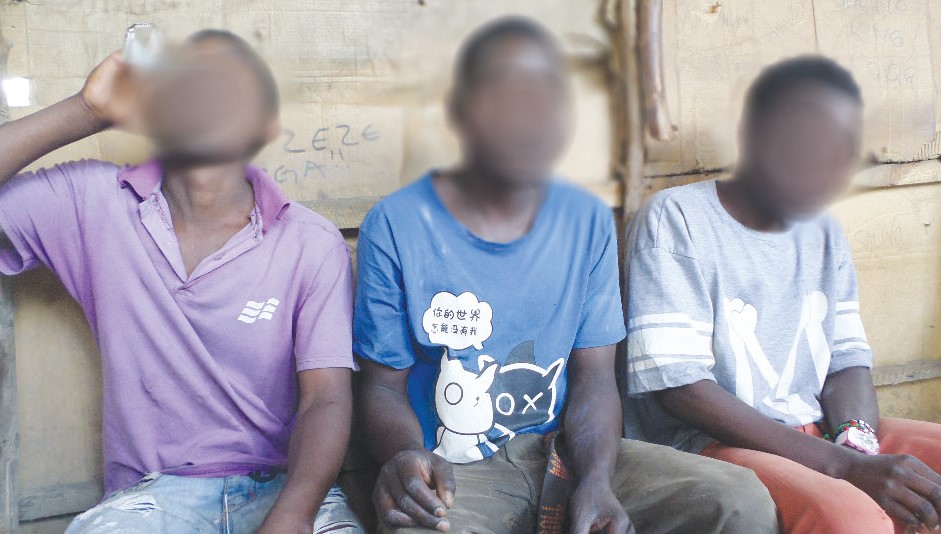On suicide mission with Ambuye N’tengeni
Two drunks lay on the ground half conscious after downing a full bottle of kachasu and Ice London, both locally distilled.
These could as well be on their way to their early graves after consuming the infamous drink in the mode of Ambuye N’tengeni that has already claimed eight lives in Manase, Blantyre.

The rate at which the most productive part of the population is drinking cheap but highly potent alcohol nationwide demonstrates a crisis the country faces.
It could as well be attributed to the tough economic environment people are operating in or mere frustrations with life as interviews with some imbibers revealed last Wednesday.
Nation on Sunday visited a shebeen near Chitawira Puma Service Station in Blantyre.
We arrived at the place at 3.06 pm alongside the two imbibers who were then sober.
Less than an hour after our arrival, the two were already knocked out.
Prior to their blacking out, a few shots emboldened them to sing a Black Missionaries song Mwana wa Munthu.
Their conduct did not bother other patrons who drank while smoking cigarettes.
The two drunks spent about K2 500 for both the kachasu and Ice London.
Despite locally brewed liquor and other cheap imported spirits posing a threat to consumers, their presence on the informal markets continues to excite imbibers who flock to shebeens in large numbers.
A former Malawi University of Business and Apllied Science (Mubas) student, withdrawn on academic grounds, said he drinks the cheap liquor out of frustration.
“I drink to drown my sorrows. I was withdrawn a year ago in my fourth year,” he said.
Another patron, Innocent Banda, who resides in Ndirande Township, also takes his frustrations out on alcohol.
The private secondary school teacher in Nkolokosa Township admitted to drinking both on his way to work and on his way home.
“This is what I can afford and it makes it easier for me to access it daily,” he said.
Yet another patron Masauko Katema said the cheap liquors bring some joy in his life; hence, it would be hard for him to stop taking them.
He said: “I feel happy whenever I am here. I find the people friendly and on a dry day when I don’t have any money, others offer theirs. We are more like family.”
Indeed, the friendliness was evident as new arrivals were offered a drink regardless of who bought it as the bottle passed around, mixing it with different brands, hardening the punch more.
Other liquors sold at the shebeen were Niasa Gin, Jambo Gin, 88, Extreme, Red Deer, Shooter, Café Rum, Right Choice, Zikomo and the infamous Ambuye N’tengeni that has claimed eight lives.
But the Manase incident could just be a tip of the iceberg as the challenges that have come with the cheap liquor are everywhere in the country.
In Lilongwe, for instance, shebeens are spread across residential areas.
Samson Mkandawire from Area 25 said in an interview on Friday that he goes for the potent liquor because they are affordable
“I everyday drink on my way to or from work,” he said.
Mkandawire, however, is struggling to access kachasu, his favourite, because of the erratic availability of sugar on the market.
He has now opted for Café Rum.
Similarly, Mayeso Samuti from Biwi Triangle said the cheap liquor will remain his favourite.
A 2019 study titled Consumption of home-made alcohol in Malawi: A neglected public health threat, found that locally made alcohol, in particular kachasu, may potentially affect health and account for a substantial proportion of the alcohol-attributable disease burden in the country.
The study, conducted in Blantyre by Thokozani Namondwe, Connel Ching’anda, Aggrey Pemba Gama and Limbikani Matumba, recommended that policies on health effects of backyard brewed beer should be addressed.
Malawi Bureau of Standards (MBS) spokesperson Monica Khombe on Wednesday said they do not monitor locally distilled liquor sold in informal markets since it is out of its jurisdiction.
She, however, said they check imported products, including liquor.
“MBS, through its imports monitoring scheme, checks if products meet relevant standards,” she said.
But Kamuzu University of Health Sciences professor and head of community and environmental health Adamson Muula in an interview on Tuesday said the challenge with cheap alcoholic beverages is that they contain harmful impurities added to enhance potency.
“Poor people want to get drunk almost immediately because they do not have the cash. Many things are added and we should be careful by sharing our knowledge.
“But we should always consider the consequences of disclosing the ingredients,” he said.
Muula also faulted a lack of commitment on implementing the National Alcohol Policy which government launched in March 2017.
The policy was launched to control harmful consumption of alcohol while also maximising revenue collection through taxes.
Part of the policy reads: “The National Alcohol Policy will, therefore, set a platform for comprehensive implementation mechanisms to ensure efficient and effective enforcement, prevention, advocacy campaigns, treatment and monitoring mechanisms for reducing alcohol attributable harms.”
Drug Fight Malawi executive director Nelson Zakeyu in an interview said the country can control both the importation and sale of unregulated alcohol if the policy was prioritised.
He said the country has mechanisms to curb alcohol abuse, in particular cheap alcohol.
He said: “The policy was developed to curb the malpractice of importation and sell of unregulated alcohol in the country. We can only see a great change if it is well implemented.”
Formulation of the policy was in line with the World Health Organisation recommendation that all member States should develop such policies to safeguard public health from harmful alcohol abuse.





